Since its founding in 1951, the Conference on Jewish Material Claims Against Germany (JCC) has devoted itself to the material compensation of Holocaust survivors and to their care. Rüdiger Mahlo, JCC representative in Germany, tells the story, frequently a pawn of top level politics. His account includes the ongoing efforts of JCC to ensure that survivors can live their lives out in dignity…

Survivors of Bergen-Belsen
Yad Vashem Photo Archive, Jerusalem. 1495/9
Today, compensation for Nazi injustice is considered an outstanding achievement both within Germany and abroad, and for decades has been an integral part of the Country’s coming to terms with its Nazi past. It therefore comes as a surprise that Holocaust survivors received their compensation at very different points in time. Survivors with similar histories of persecution were compensated as early as the mid-1950s, yet others had to wait decades longer. The gradual expansion of compensation for victims of Nazi persecution was closely linked to German foreign policy and always inextricably bound to macro-political trends. In other words, the Cold War influenced compensation policy just as much as the rapprochement between East and West, the fall of the Iron Curtain or German reunification. Compensation for Nazi injustice was apparently a pawn of top level politics.
Bureaucratic obstacles
The acceptance of Germany into the international community following the genocide, was only conceivable once the Federal Republic had accepted responsibility for the crimes against European Jews. It was Chancellor Konrad Adenauer who opened the path for reparations when in a 1951 speech to the Bundestag, he publicly declared that the unspeakable crimes committed in the name of the German people compelled both moral and material compensation.
In Israel, the opening of compensation negotiations with the Federal Republic was the subject of an emotionally charged discussion. Tumultuous scenes played out during a two-day Knesset debate on the issue. There were mass demonstrations and street riots in front of the Knesset that could even be heard in the plenary chamber. Nevertheless, Prime Minister David Ben-Gurion finally secured approval for negotiations with his parliamentary majority.
The Conference on Jewish Material Claims Against Germany (JCC), founded in 1951 as a governing body of 23 international Jewish organizations representing Jewish Holocaust survivors in their claims for compensation against the Federal Republic, was strongly committed to negotiations with Germany. If negotiations were focused on atonement on the German side, the emphasis was placed on the legal and material character on the Jewish side; they were neither willing nor able to speak about moral and ethical principles so soon after the Shoah.
The roadmap for negotiations between the Federal Republic and Israel as well as the Claims Conference was thereby laid out. One preliminary result was the commitment of the German government to regulate individual compensation. To push this project, controversial in Germany as it was, through parliament in 1956 under the name of the German Restitution Laws (BEG), Adenauer had to resort to the votes of the opposition, mainly the social democrats. Initially intended solely for Jews born in Germany, the BEG was expanded through the intervention of the Claims Conference to include the entire area where German was spoken and German culture prevailed, as well as stateless displaced persons. For Jewish victims of the Nazis who did not have German citizenship before the Shoah, that meant having to prove they belonged to the area of German language and culture. If that was not possible, they had to pass a German language test in a foreign mission of the Federal Republic.
Despite this considerable expansion at first, a great many survivors from Western and Eastern Europe were excluded from those entitled to compensation. Following the expiration of the deadline for applications on 31 December 1969, no more claims could be filed. For the group called the “western victims,” the Federal Republic attempted to provide compensation through global agreements with individual Western European states. Most of these people, however, received small, one-off payments or nothing at all. Part of the funds were transferred to these states’ general social welfare systems and thus did not serve their purpose of indemnifying Nazi victims. Against the backdrop of the Cold War, however, West Germany refused to pay compensation to Eastern Bloc states. For this reason, a considerable number of Jewish victims of the Nazis died without any material acknowledgement of their suffering.

Aged victims of the NS-regime like Auschwitz survivor Eva Szepesi have different needs today than in the first decades following liberation
(c) Marco Limberg
The situation compelled the Claims Conference to reopen negotiations. In 1980, following difficult talks, agreement was reached on guidelines for the West German government to make one-time payments to Jewish victims of the Nazis from Eastern Europe who had emigrated to the Western Hemisphere. Survivors in Eastern Europe as well as most western victims were still excluded.
Once the Wall had fallen and German reunification was becoming a foreseeable reality, the Claims Conference brought the matter of compensation and restitution by East Germany to the table. It demanded monthly pension payments including for those Jews who suffered most under persecution but who, as a result of failing to satisfy residence requirements, had previously been excluded. The Federal Republic finally conceded to the establishment of a new fund from which Jewish applicants who fulfilled so-called minimal persecution periods in concentration camps, ghettos, in hiding, or illegal existence, could receive a monthly pension. Victims living in Eastern Europe continued to be excluded.
Only in 1998 did negotiations by the Claims Conference secure pension payments for Eastern European Jews. Yet the pension level was only 50 percent of the amount paid in the West. Victims from Eastern Europe who had escaped by fleeing, for example, from being murdered by special SS death squads, were not included in this enlargement.
In 2012, following pressure by the Claims Conference, compensation levels in the East were adjusted to those in the West. In 2013, the German government approved one-time payments to those Jewish victims in Eastern Europe who had fled Nazi persecution. Almost 70 years after the Holocaust, nearly 100,000 Jewish victims of the Nazis received a one-off payment of 2,556 euros for their suffering.
A dignified old age
To this day, the Claims Conference continues to advocate liberalization of the strict inclusion criteria to its fund. For example, minimal incarceration times in concentration camps have been reduced from 18 months to three. This extended the number of people entitled to compensation.
Today, nearly all major gaps in the compensation system have been closed. Meanwhile, however, the in-home care urgently needed by the aged and often sick and infirm Holocaust survivors, is increasingly coming to the fore. Today, many of the Jewish victims of the Nazis live below the poverty line. The Nazi persecution that destroyed their families also deprived these people of possibilities for professional training that could have guaranteed sufficient income later in life. In collaboration with the German government, the Claims Conference is working to ensure that these people are not abandoned – as was the case over 70 years ago – and can at least live out their lives in dignity. This joint mission has not yet been accomplished.■
Rüdiger Mahlo is the representative of the Claims Conference
in Germany
